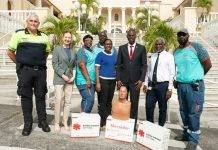SINT MAARTEN, PHILIPSBURG – The Ministry of Tourism, Economic Affairs, Transportation and Telecommunication (Ministry TEATT) has collaborated with Sol to provide a clear and transparent summary as to how fuel prices are accurately determined on the island for consumers as well as where it comes from and the logistical process.
The Sol Group is a member of the Canada based Parkland family, the leading supplier of petroleum-based products and energy solutions in the Caribbean, as well as in North, Central and South America with operations spanning 22 countries.
Fuel in Sint Maarten arrives from the Gulf of Mexico area. The Gulf of Mexico is a major source of oil and natural gas for North America and accounts for 15% of total U.S. crude oil production.
Sol as the main importers submit their request(s) to the Ministry of TEATT via the Department of Economy, Transport & Telecommunication (ETT) to adjust the fuel prices, based on the stock out date of its fuel at the previous posting price.
Upon receipt ETT confirms the posting price and then proceed to prepare the appropriate regulation to adjust the prices for gasoline and diesel. The confirmed posting price is then inserted to our government approved price buildup model which includes freight, taxes, and importer margins.
The final price change is then approved by the Minister of TEATT. It should be stated that the importer margin is a fixed nominal margin, not a percentage; the current increases in prices have no impact on this margin.
It is important to note that the price change does not go into effect until Sol transitions over to the new stock which was purchased at the updated price. This would explain why price adjustments to the fuel price may take a few weeks between the adjustment of the fuel product price listings, and there is no established timeframe between price changes.
The current global events continue to have a major impact on the global oil prices. The cost of a barrel of crude oil has increased by 44% since the end of January, this subsequently directly impacts the prices of refined products such as gasoline, but also has impacted the transportation costs to get the fuel to Sint Maarten.
Despite the slight delays in changes, there is a direct correlation between the global crude oil prices and the consumer prices for petroleum products on Sint Maarten.
“It is important that we are aware of the source of our products and all that contributes to the build-up of our fuel prices. The ministry will continue to be transparent regarding the fuel changes and in the meantime, we will continue to monitor the situation very closely,” Minister of Tourism, Economic Affairs, Transportation and Telecommunication Hon. Roger Lawrence stated on Sunday.
Sol says it will continue to import safe inventories of the high-quality fuels as we are committed to serve the Sint Maarten community. Sol added that they do this despite the current global developments which are adversely impacting the cost of providing fuel to their valued customers.
Robert-Jan James, General Manager of Sol Antilles indicated, “We recognize the important role that fuel plays in our communities and businesses and as we continue to monitor the impact of the global dynamics. We are hopeful for the normalization of fuel costs in the shortest possible time.”
Sol schedules cargo deliveries several months in advance to ensure security of supplies to Sint Maarten and to avoid stock outs. There are several transshipment points in use to store the product as it is shipped from the Gulf into the Eastern Caribbean Region. These include St. Croix, Trinidad, Antigua & Barbuda, and St. Lucia.
These also provide contingency storage to allow a robust delivery service. From these locations the fuel is then transported to Sint Maarten by smaller tankers. These tankers subsequently supply fuel through the underwater piping system in Cay Bay into the shore storage tanks from where it is distributed throughout the island.
A sample testing was performed in Sint Maarten in 2019 to determine the octane rating of the gasoline sold on the island.
On the northern side of the island and at the international level, consumers are given a choice of what octane level they wish to purchase, 85,88,90, 95. In Sint Maarten consumers are offered the high-octane level. Octane 95 is considered a premium.






























